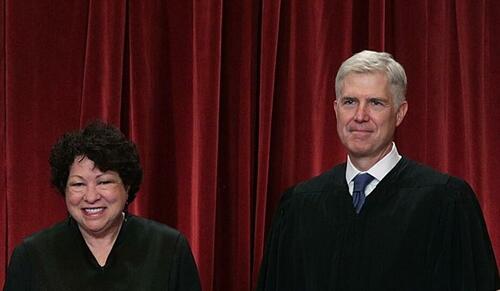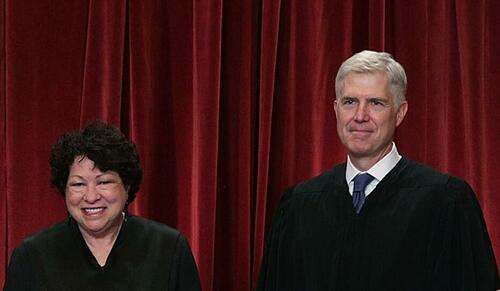Authored by Matthew Vadum via The Epoch Times (emphasis ours),
The Supreme Court limited the reach of the federal Identity Theft Penalty Enhancement Act, unanimously rebuffing the Biden administration’s efforts to prosecute a man already convicted of Medicaid fraud with a separate charge of aggravated identity theft arising out of the same fraud case.

The 9–0 opinion (pdf) in Dubin v. United States (court file 22-10) was issued on June 8 and authored by Justice Sonia Sotomayor. Justice Neil Gorsuch filed a separate concurring opinion.
The Identity Theft Penalty Enhancement Act mandates a two-year prison sentence for violations.
When then-President George W. Bush signed the law in 2004 he said it established the federal “offense of aggravated identity theft” to ensure someone convicted of that crime would receive jail time “for stealing a person’s good name.”
“These punishments will come on top of any punishment for crimes that proceed from identity theft,” the 43rd president said at the time.
The act, Bush added, “raises the standard of conduct for people who have access to personal records through their work at banks, government agencies, insurance companies, and other storehouses of financial data.”
But the Supreme Court disagreed with the U.S. Department of Justice’s argument that petitioner David Fox Dubin was automatically guilty under the act because a fraudulent Medicaid billing form include the patient’s Medicaid reimbursement number as a “means of identification.”
Dubin worked as a managing partner for PARTS, a company in Austin, Texas, created by his father, licensed psychologist William Dubin.
Both men were convicted by a U.S. district court for a scheme to defraud Texas’s Medicaid program.
Medicaid is a joint federal-state program that serves low-income people of all ages and varies from state to state. It is run by state and local governments within federal guidelines. Each state sets its own rules about eligibility and services.
Bound by the U.S. Court of Appeals for the 5th Circuit precedent, the U.S. district court allowed Dubin’s conviction for aggravated identity theft to stand even though the district court believed the crux of the case was fraudulent billing, as opposed to identity theft. A divided 5th Circuit upheld the conviction in March 2022 despite its acknowledgment that according to the government’s interpretation of the act, “the elements of [the] offense are not captured or even fairly described by the words ‘identity theft.’”
Dubin’s attorney, Jeffrey L. Fisher, a professor at Stanford Law School, said he was pleased with the Supreme Court’s ruling.
“We’re grateful for the Court’s decision for Mr. Dubin’s sake and are pleased in general that the Court has reigned in the prosecutorial overreaching the statute allowed,” Fisher told The Epoch Times by email.
The case goes back to 2013 when David Fox Dubin filed a claim with Medicaid for $540 for services provided to someone identified as Patient L. The government did not dispute that the psychological examination practice treated the patient or had the authority to use the patient’s name in the billing process, according to Dubin’s petition (pdf) that was filed with the Supreme Court in June 2022.
“Instead, the government’s theory was that [the] petitioner overbilled Medicaid for the services provided,” which was sufficient for a conviction for health care fraud.
“But the government was not content with that conviction. It also indicted [the] petitioner for aggravated identity theft,” the petition stated. The government’s position was that Dubin violated the identity theft law because he placed Patient L’s “identifying information on the fraudulent Medicaid claim form.”
Justices pushed back against the government’s arguments that were presented by U.S. Department of Justice attorney Vivek Suri at a hearing on Feb. 27.
Read more here…
Loading…
https://www.zerohedge.com/political/government-overreached-identity-theft-case-supreme-court-rules-unanimously






